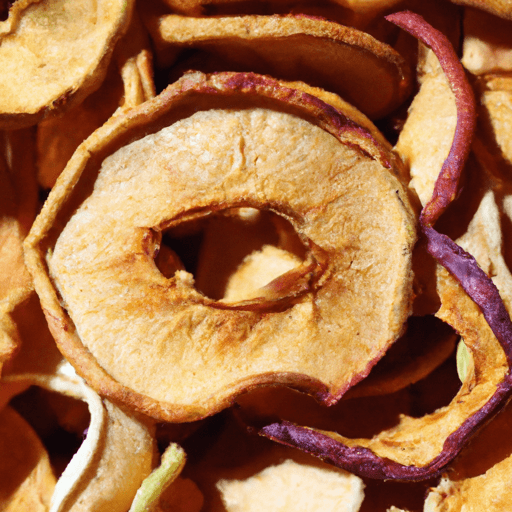All About Dried Apples: A Flavorful and Nutritious Delight
Dried apples are a delightful treat that combines the natural sweetness of apples with a chewy and concentrated texture. This versatile and nutrient-packed snack is a favorite among both children and adults. Let’s dive into the wonderful world of dried apples and discover their taste, culinary uses, nutritional value, and fascinating history.
Taste and Texture
Dried apples offer a unique blend of flavors and textures that make them a truly enjoyable snack. When biting into a piece of dried apple, you’ll experience a delicious combination of sweetness, tartness, and a slightly chewy texture. The drying process intensifies the natural sugars of the apple, resulting in a powerful burst of fruity goodness with every bite.
Culinary Uses
Besides being a delicious snack on their own, dried apples can be utilized in various culinary creations. Here are a few popular uses:
1. Baked Goods
Dried apples add a delightful twist to many baked goods. You can chop them up and incorporate them into muffins, cakes, bread, and granola bars to infuse a burst of sweet and tangy flavors. The dried apples’ concentrated taste pairs well with spices like cinnamon, nutmeg, and cloves, making them an ideal addition to fall-inspired recipes.
2. Trail Mixes and Granola
For a nutritious on-the-go snack, combine dried apples with nuts, seeds, and other dried fruits in a homemade trail mix. Their chewy texture and natural sweetness provide a satisfying and energizing pick-me-up during busy days. Dried apples also make for a delightful addition to homemade granola, offering an extra burst of flavor and texture.
3. Stuffings and Stews
In savory dishes, dried apples bring a unique twist and balance to the overall flavor profile. They work exceptionally well in stuffings for poultry or pork, adding a touch of sweetness that complements other savory ingredients. Similarly, when added to stews or braised dishes, dried apples can create a complex and harmonious taste experience.
Nutritional Value
Dried apples pack a punch when it comes to nutritional value. They are rich in dietary fiber, which aids in digestion and promotes a healthy gut. Additionally, dried apples are a good source of vitamins such as vitamin C and antioxidants that help protect the body against cell damage. These wholesome snacks are also fat-free and relatively low in calories, making them a guilt-free treat for the health-conscious.
History and Fun Facts
Drying fruits has been a preservation method used for centuries, allowing people to enjoy the goodness of fruits even during the off-season. Apples, being one of the most abundant and versatile fruits, have a long history of being dried for culinary purposes. In fact, dried apples were a staple in the diets of early American settlers, providing valuable sustenance during long winters when fresh produce was scarce.
Interestingly, during the American Civil War, dried apples were a common food item among soldiers due to their light weight and long shelf life. They were easily rehydrated to create a simple and nourishing meal. This historical significance adds to the charm of dried apples and their enduring popularity through the years.
Dried apples are a delicious, healthy, and versatile treat that holds a special place in the culinary world. Their unique taste, diverse culinary uses, nutritional benefits, and fascinating history make them a worthwhile addition to any pantry. Whether enjoyed as a standalone snack or incorporated into various recipes, dried apples bring joy to both sweet and savory dishes. So go ahead, savor the goodness of dried apples and experience their delightful flavors for yourself!
Dried Apples
Origin: Dried apples have a long history, dating back to ancient times. The drying process was employed as a way to preserve the fruit for later use, especially during winter or long sea voyages. The exact origin of dried apples is unknown, but they have been popular throughout Europe, Asia, and North America for centuries.
Common Uses: Dried apples are versatile and can be used in various culinary preparations. They are commonly used as a snack on their own, mixed with other dried fruits in trail mixes, or added to baked goods such as cakes, muffins, or cookies. They can also be rehydrated by soaking them in water or juice and used in compotes, sauces, or pie fillings.
Nutritional Benefits: Dried apples retain many of the nutrients found in fresh apples, making them a healthy choice. They are a good source of dietary fiber, which aids in digestion and helps promote satiety. They also contain vitamins A and C, which are important for maintaining a healthy immune system, as well as potassium, which is essential for proper muscle function.
Unique Properties: One unique property of dried apples is their concentrated flavor. The drying process removes the water content from the apples, intensifying their natural sweetness and tanginess. Dried apples also have a chewy texture that can add interesting texture contrasts to dishes or enhance the enjoyment of snacking.
Historical Significance: In early American history, dried apples played a crucial role in frontier life. They were a staple food item in pioneer households as they could be stored for long periods without refrigeration. Dried apples were often used in pies and stews, providing nutrition and variety, especially during the winter months when fresh produce was scarce.
Remember, dried apples should be consumed in moderation as they are higher in sugar and calories compared to fresh apples.




Use the share button below if you liked it.
It makes me smile, when I see it.